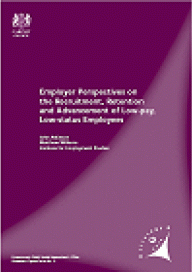Publications
 We author and publish a range of resources to keep you up to date with the latest developments in employment, labour market and human resource policy and practice.
We author and publish a range of resources to keep you up to date with the latest developments in employment, labour market and human resource policy and practice.
All our pdf publications are free to access.
Search results
-

Cognitive Factors' Influence on the Expression and Reporting of Work-Related Stress
Daniels K, Jones D, Perryman S, Rick J, Fergusson E | Feb 2004 | Health and Safety ExecutiveThere is debate over the extent to which psychosocial hazards really influence occupational ill-health, or whether findings from research reflect individual differences, related to factors such as personality and attitudes. That is, whether work conditions, individual differences, or a combination of both influence stress-related illness. This debate has many implications: for our understanding of work related stress; for the extent to which changes in organisational practice can reasonably be expected to reduce stress-related illnesses; and for the means of assessing stress-related illness to gauge the success or otherwise of interventions. This research seeks to examine aspects of this debate and outline some of the implications for policy and organisational practice.
-
📄
Managers as Developers of Others - Personal Experiences of Pleasure and Pain
Hirsh W, Silverman M, Tamkin P, Jackson C | Feb 2004 | Institute for Employment StudiesThis paper presents a small selection of a large volume of data collected in a study that investigated the behaviour of managers who are good at developing other people in the workplace. It was conducted in four major UK organisations.
-
📄
Managers as Developers of Others - A Literature Review
Silverman M | Feb 2004 | Institute for Employment StudiesThe paper covers: the growing role of the line manager in development; managers as career developers; managers as mentors and coaches for staff; the business importance of managers as developers; developing the competency to develop others; barriers to staff development; and relation to management theories and formal frameworks.
-
📄
Understanding Employee Opinions
Robinson D | Jan 2004 | Institute for Employment StudiesThis briefing aims to help you think about employee opinions, specifically: Why collect employee opinions in the first place. Is there are business benefit? What different methods are available for gathering employee opinions, and which is best for your organisation? How can your employee opinion survey really help you in understanding and managing your workforce?
-
📄
Survivor Syndrome
Key Considerations and Practical Steps
Wolfe H | Jan 2004 | Institute for Employment StudiesDespite the relative lack of empirical work about survivor syndrome, there seems little doubt of its existence, and the challenges it poses not only to the HR function, but also the organisation as a whole. Strategies for tackling such an issue are highly organisation-specific, but there are several overriding themes and considerations that may help inform approaches to current, and future, organisational change.
-

Healthy Attitudes
Quality of Working Life in the London NHS, 2000-2002
Robinson D, Perryman S (eds) | Dec 2003 | Institute for Employment StudiesThe first Human Resource Strategy for the NHS ('Working Together') was published in September 1998. This required all NHS employers to carry out annual surveys of the attitudes of their staff. Since then, IES conducted three annual London-wide surveys, on behalf of a total of 99 London employers. A total of 97,000 employees at all levels completed questionnaires. This report encapsulates their views.
-
📄
Working Long Hours: a Review of the Evidence
Volume 1 - Main Report
Kodz J, Davis S, Lain D, Strebler M, Rick J, Bates P, Cummings J, Meager N | Oct 2003 | Department of Trade and IndustryLong hours working is more common in the UK than most other countries, but quite similar to the US, Australia and Japan. After a period of long-term decline, the proportion of employees working over 48 hours a week rose through most of the 1990s (though by the early 2000s it had started to decline again). Excessive long hours working is associated with (though not proved to cause) lower productivity, poor work performance, health problems and low employee motivation.
-

Best Practice in Rehabilitating Employees Following Absence Due to Work-Related Stress
Thomson L, Rick J, Neathey F | Jun 2003 | Health and Safety ExecutiveThis report identifies specific examples of best practice following absence due to stress-related illness, and various factors that influence its effectiveness. It considers the historical development of any rehabilitation practices within the case study organisations, and describes the key factors influencing the development of procedures.
-

Employer Perspectives on the Recruitment, Retention and Advancement of Low-pay, Low-status Employees
Atkinson J, Williams M | Jun 2003 | Cabinet OfficeLow skill, low status jobs in the UK can constitute a first step on a ladder to rising lifetime earnings, in which experience, tacit skills, contacts and know-how can be acquired and used to promote a pay off later. However, in practice, they provide little or no basis for substantial advancement through the labour market: the evidence suggests that short-term mobility in the wage distribution is limited, and that individuals who do progress, do not generally progress very far.
-
📄
A Review of Current Research into Absence Management
Hill D, Hayday S | Apr 2003 | Institute for Employment StudiesThis paper reviews the most recent findings in absence statistics and attendance management. This will serve as a resource for researchers and HR managers attempting to understand what can be done to improve attendance management, and also to compare and contrast the various absence statistics among different business types, and job functions.
